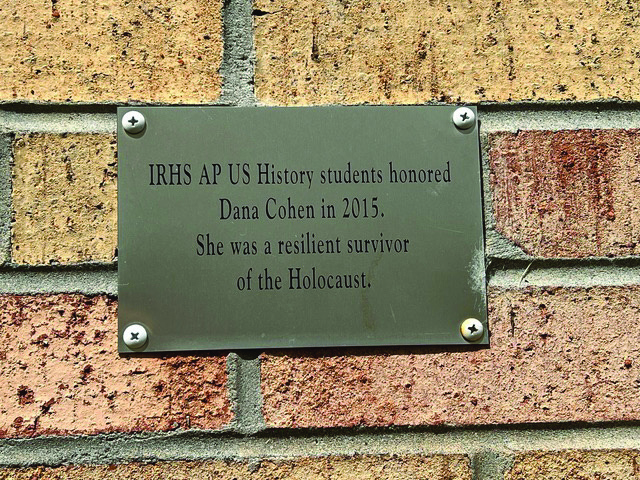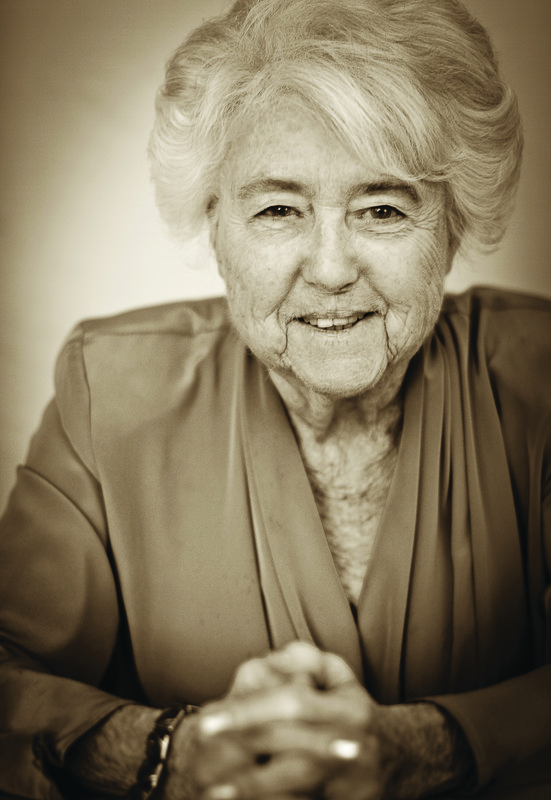In 2010 when the Holocaust Commission conceived of what would become the What We Carry program, its previously robust survivor Speakers Bureau was beginning to shrink. Witnesses to history continued to leave us, but eventually the program grew, and consisted of films with direct testimonial footage from each of five local survivors, two liberators, and one rescuer, along with replicas of artifacts and mementos of each that travel to schools, military installations, and community groups to educate about the lessons of the Holocaust.
At the program’s kickoff, survivors profiled would sometimes accompany the docents to speaking engagements, allowing the films to tell their stories, and then fielding questions from students and other learners. Commission members loved to take survivors to meet their “fans,” and the What We Carry presentations were less taxing on the survivors, as they did not have to retell their story each time.
But 15 years later, that opportunity is now no longer available. With the passing earlier this month of survivor Dana Cohen, our community has now lost every featured WWC storyteller. A survivor of the Russian invasion of Poland, deportation to a Siberian slave labor camp, and a harrowing wartime journey that eventually landed Dana and her mother in Koja, Uganda, after her father was murdered by the Russian Army in the Katyn Forest Massacre, Dana’s story was not what most people think of when they think of the Holocaust. In fact, though her mother wrote a memoir of their struggles (which she described as “one long chain of miracles”), Dana did not actively participate in educating about that history until she went on a mission to eastern Europe with United Jewish Federation of Tidewater in 1999.
When she returned from the trip, she joined the Holocaust Commission and became one of its most stalwart speakers. Her soft spoken but direct manner, and her natural elegance and grace, created interest in history in even the most reluctant of middle school students. She also often taught adults about a lesser-known part of the Holocaust, that did not include any of the 40,000+ Nazi camps in Europe. She never judged, but accepted those around her with respect and caring, which is hard to imagine considering the life and death struggles she endured when others judged her for no reason other than her religion.


She was beloved by many educators, but like her fellow WWC speakers, David Katz, Hanns Loewenbach, Kitty Saks, and Mary Barraco, she was a particular favorite of Esther Goldman Award-winning master teacher at Indian River High School, Craig Blackman. At Dana’s funeral, he and I reminisced about the special days he organized for Mary, Kitty, and Dana at IRHS, bringing hundreds of students together to honor these brave women. He made sure the students knew how special the ladies were, and they created and performed art for them, cooked dishes from their native countries for them, and showered them with love. At the end of each day of honor, the students planted a tree in a memorial garden. Their trees still flourish, reminding faculty and alumni, and educating current students, about the powerful lessons these women shared.
It is the end of an era when perhaps we need the voices of survivors more than ever.
We are living in a time when the few who are left are seeing parallels to things they witnessed in Germany’s nascent democracy, that eventually led to the Holocaust –government officials tried to erase parts of the country’s history, stirring patriotism with scapegoating “the other.” This seems hauntingly familiar, as cultural conversations that were not long ago bringing us together to acknowledge our country’s checkered past and move forward with more unity, have shifted. History has many examples of how this can end, and none are pretty.
Kitty Saks, in her What We Carry film, talks about living through the Anschluss in Vienna and what came after, and her father’s “not seeing the writing on the wall.” When they came for his business, “THEN he saw the writing on the wall!” But of course, by then the snowball was already headed downhill and picking up steam. All of our beloved local survivors believed that America was a land of opportunity, and were grateful to have been able to make their lives here after their countries capitulated to dictatorship. But they knew that its success depended on the freedoms guaranteed by our Constitution.
Let us listen to the voices of history’s witnesses, its historians, and our hearts, and know that in our Democracy, we are all created equally, and our Constitution applies to us all. Survivors all tell a cautionary tale. We all need to remember that the Constitution itself, like the least powerful in our country, has no voice. Both need our defending. As Dana’s fellow survivor Hanns Loewenbach always ended his presentations, “Evil does not need your help. Just your indifference.”
Elena Barr Baum is a former director of the Holocaust Commission, and the current president of the Ukrainian Humanity Center (www.ukrainianhumanitycenter.org).

